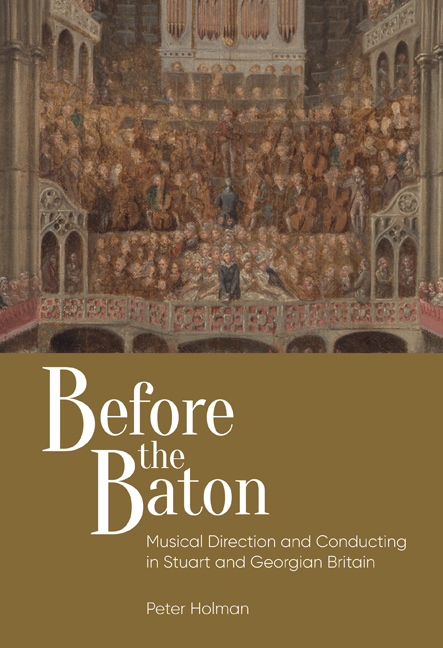Book contents
- Frontmatter
- Dedication
- Contents
- List of Illustrations
- Foreword
- Acknowledgements
- Note to the Reader
- List of Abbreviations
- Prelude To Beat or Not to Beat: The Continental Context
- Part I Directing Choral Music
- Chapter 1 ‘Heard but not Seen’: Leading Anglican Cathedral Music from the Organ
- Chapter 2 ‘With a Scroll of Parchment or Paper, in Hand’: Large- Scale Choral Music
- Chapter 3 ‘Accompanied all along on the Organ by his Own Inimitable Hand’: Handel and the Direction of his Oratorios
- Chapter 4 ‘The Conductor at the Organ’: The Oratorio Tradition after Handel
- Part II Directing Opera and Theatre Music
- Chapter 5 ‘That Ridiculous Custom’: From Devolved Direction to Centralized Time-Beating in Seventeenth-Century Theatre Music
- Chapter 6 ‘Il maestro al cembalo’: Directing Opera and Theatre Music from the Harpsichord
- Chapter 7 ‘A New Discipline and a New Style of Playing’: Directing Opera and Theatre Music from the Violin
- Chapter 8 ‘That Powerful Sovereign, the Conductor’: From the Piano to the Rostrum
- Postlude Superconductors or Semiconductors? Lessons for Today
- Bibliography
- Index
- Miscellaneous Endmatter
Chapter 4 - ‘The Conductor at the Organ’: The Oratorio Tradition after Handel
Published online by Cambridge University Press: 11 September 2020
- Frontmatter
- Dedication
- Contents
- List of Illustrations
- Foreword
- Acknowledgements
- Note to the Reader
- List of Abbreviations
- Prelude To Beat or Not to Beat: The Continental Context
- Part I Directing Choral Music
- Chapter 1 ‘Heard but not Seen’: Leading Anglican Cathedral Music from the Organ
- Chapter 2 ‘With a Scroll of Parchment or Paper, in Hand’: Large- Scale Choral Music
- Chapter 3 ‘Accompanied all along on the Organ by his Own Inimitable Hand’: Handel and the Direction of his Oratorios
- Chapter 4 ‘The Conductor at the Organ’: The Oratorio Tradition after Handel
- Part II Directing Opera and Theatre Music
- Chapter 5 ‘That Ridiculous Custom’: From Devolved Direction to Centralized Time-Beating in Seventeenth-Century Theatre Music
- Chapter 6 ‘Il maestro al cembalo’: Directing Opera and Theatre Music from the Harpsichord
- Chapter 7 ‘A New Discipline and a New Style of Playing’: Directing Opera and Theatre Music from the Violin
- Chapter 8 ‘That Powerful Sovereign, the Conductor’: From the Piano to the Rostrum
- Postlude Superconductors or Semiconductors? Lessons for Today
- Bibliography
- Index
- Miscellaneous Endmatter
Summary
❧ Handel's Successors
AFTER Handel's death on 14 April 1759 his oratorio seasons were continued at Covent Garden by John Christopher Smith junior and John Stanley. They moved from Covent Garden to Drury Lane in 1770, and Smith retired after the 1774 season. Stanley ran the 1775 season alone but in 1776 he went into partnership with the Bath musician Thomas Linley senior (who was in process of purchasing a share in the Drury Lane Theatre with his son-in-law Richard Brinsley Sheridan), an arrangement that lasted until early 1786, when Stanley retired because of ill health (he died on 19 May) and was replaced by Samuel Arnold. Linley and Arnold moved temporarily to the King's Theatre in 1792, and in 1794 Linley moved back to the rebuilt Drury Lane theatre for a season in partnership with Stephen Storace. After Linley's death on 19 November 1795 the direct tradition deriving from Handel came to an end, though oratorio seasons continued until 1840, when the restrictions on stage productions in the London theatres during Lent were finally lifted. There were also various competing oratorio seasons, put on by, among others, Thomas Arne (DL, 1761, 1762); Thomas and Michael Arne (CG, 1773); Samuel Arnold and Edward Toms (LTH, 1768, 1769; CG, 1770–2; LTH, 1773); J.C. Bach (HT, 1770, 1771); François-Hippolyte Barthélemon (LTH, 1774, 1779); Bach and C.F. Abel (HT, 1775); Arnold alone (CG, 1776, 1777); James Hook (CG, 1778); Michael Arne and Barthélemon (LTH, 1784); Michael Arne alone (LTH, 1785); John Ashley and Samuel Harrison (CG, 1789–92); and Ashley alone (CG, 1793–1805).
For Handel, an important attraction of oratorio must have been the opportunity to run a large-scale musical enterprise free from the aristocratic committees that were always in control of Italian opera companies. Similar motives seem to have impelled William Hayes to develop his own circuit of provincial festivals mostly devoted to Handel's oratorios (Ch. 2), and the musicians who ran the London oratorio seasons in Handel's wake normally organised and promoted them in person, largely independently of the theatre managements.
- Type
- Chapter
- Information
- Before the BatonMusical Direction and Conducting in Stuart and Georgian Britain, pp. 141 - 178Publisher: Boydell & BrewerPrint publication year: 2020

